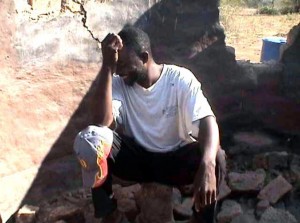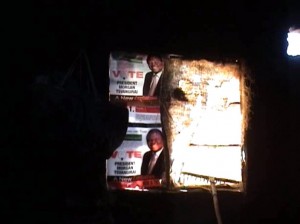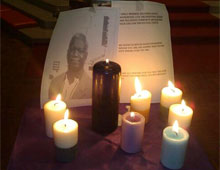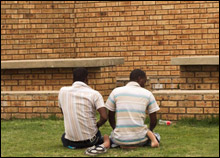On the 15th September 2008 Zanu PF and the two MDC formations signed a political agreement brokered by Thabo Mbeki under the mandate of SADC. The agreement was the culmination of a process that had begun in March 2007, which was itself preceded by various other attempts by African leaders, as far back as 2004, to bring an end to the Zimbabwean political crisis. The central aim of the September agreement was to find a power sharing arrangement that would reflect the balance of political power in the country after the March 2008 Harmonised elections, which, together with the abortive presidential run-off election at the end of July 2008, left the issue of the presidential election unresolved. While the Agreement left key areas, such as the allocation of ministerial portfolios unresolved, it also comprised a good basis for moving the political situation forward in Zimbabwe.
However one of the major silences in the Agreement was around the area of Transitional Justice. This was not surprising given the fact that Zanu PF, the major perpetrator of human rights offences in the post-colonial period, was not likely to support such a process. Moreover the MDC for its part, though not without its own problematic history of intra-party violence, neither sought to make this issue a deal breaker in the negotiations, nor had the political muscle to enforce such an inclusion. Thus the September 2008 Agreement contained one section that set out to:
..give consideration to the setting up of a mechanism to properly advise on what measures might be necessary and practicable to achieve national healing, cohesion and unity in respect of victims of pre and post independence political conflicts. (Read more…)
Thu, January 15 2009 » Essays, Global Political Agreement, Transitional justice » Leave a comment
The year 2008 began with high hopes for a more free and fair election in Zimbabwe, and with the accompanying possibilities of this opening up sufficient space for the nation to begin to redress its one hundred years of state violence and impunity. However, the year is heading into its final weeks with little to be optimistic about, with the power sharing agreement of 15 September in jeopardy and the nation facing its most severe economic and humanitarian crisis ever. The months from April to June saw the worst state violence since the Gukurahundi massacres of the 1980s. Around 200 civilians lost their lives, with thousands more suffering torture and assaults as well as loss of their homes or other property as ZANU PF ruthlessly set out to reverse the gains that the opposition had made in the March election. War vet bases and torture camps were set up across the country; threats and coercion accompanied often by systematic torture became nightly events across all provinces, and even in urban centres.
The violence was allegedly masterminded and ignited by senior officers in the police and army who came and went in rural areas – but they have left a shocking legacy at the village level where shattered communities are now battling to deal with the devastating consequences. Much of this violence took place at the intra community level, and took the form of neighbours against neighbours, or even of family members brutally attacking other members. Within ten weeks, appalling damage was done to the social fabric in rural villages across the nation. Almost every victim of this violence can name at least some of their perpetrators, as they are from their local ZANU PF and war vet structures, or are local youth forced into taking part in beating those known to be MDC activists or supporters. Retributive violence is now taking place in some areas, while in others the perpetrators of terrible violence including murder continue to walk free and to threaten and sneer at their still cowering and extremely depressed fellow villagers. (Read more…)
Thu, January 15 2009 » Essays, Transitional justice » Leave a comment

A man in Gokwe sits in the ruins of his house destroyed by youth militia and war vets in May 2008.
In its report on the March 29th 2008 Harmonised Election the Solidarity Peace Trust recorded the widespread state-led violence that followed the Zanu PF’s electoral loss in that plebiscite, in the context of the SADC led mediation that failed to break the political deadlock in the country. The lack of an outright winner in the Presidential election, and the controversy surrounding the long delay in the announcement of result of this election, resulted in the Presidential run-off on the 27th June 2008 and after as this report shows. (Read more…)
Tue, July 29 2008 » Election violence, Global Political Agreement, Human rights, Reports » 1 Comment

Report Cover Photo: In a brave act of defiance, posters of Morgan Tsvangirai hang on the wall of a hut burnt by ZANU PF supporters in Shamva, Ap
The 2008 Harmonised Election in Zimbabwe was arguably the most historic of the post-independence elections, as for the first time in the last 28 years the ruling party lost its parliamentary majority and the President lost the first round of the Presidential election. This result represented the culmination of a decade of political and civic opposition to a former liberation party whose legitimacy has been greatly eroded by nearly three decades of intolerant rule. At a national level it is a clear message that despite the extremely harsh and repressive political environment in which elections have been conducted in Zimbabwe, the people of the country found the “resources of hope” required to say no to continued authoritarian rule. (Read more…)
Wed, May 21 2008 » Election violence, Human rights, Reports » Leave a comment
HOT SEAT INTERVIEW : Journalist Violet Gonda interviews political commentators Dr John Makumbe and Professor Brian Raftopoulos on the elections in Zimbabwe . Who will benefit more in a Presidential run-off and who stands to lose?
Violet Gonda: We welcome political commentators Dr. John Makumbe in Zimbabwe and Professor Brian Raftopoulos in South Africa . Hello there and thank you for joining us on the program Hot Seat.
Makumbe/Raftopoulos: Hello Violet.
Violet: Now controversy has marred the elections in Zimbabwe as the main political parties are jostling for power. The opposition Movement for Democratic Change says its leader Morgan Tsvangirai won the Presidential election while ZANU PF has rejected these claims. Let me go first to Dr. Makumbe, what is your assessment of the situation right now? (Read more…)
Fri, April 4 2008 » Interviews » Leave a comment















